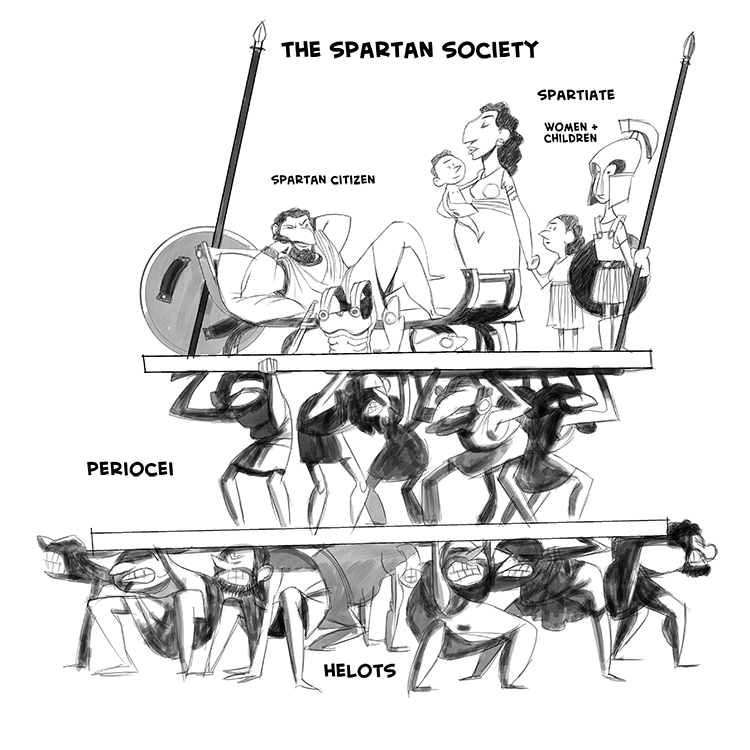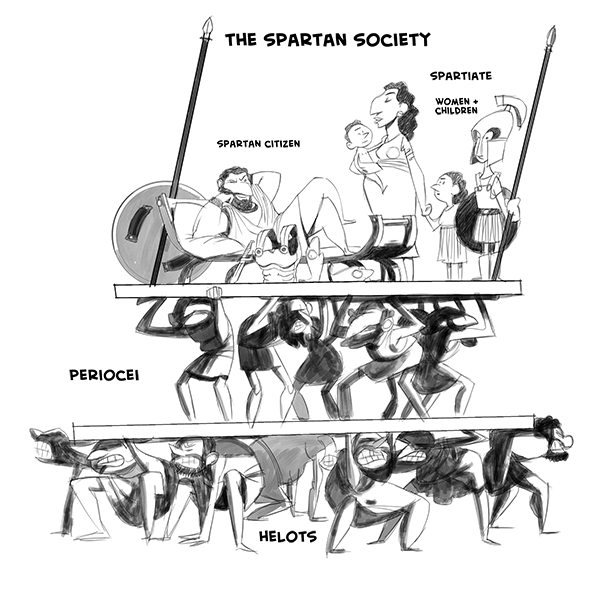Today, the word “spartan” is used to describe someone or something that is elegantly simple, disciplined, minimalist, and “in control.”
We get this word from our ancient Greek ancestors, the ones who lived in the city-state Sparta.
A highly-militaristic culture, the Spartans did indeed value minimalism and self-control. But what else did they value? What was it actually like to live in ancient Sparta?
Well, the answer to that question depends considerably on who we’re talking about. Ancient Sparta was a highly-unequal place, and how well you lived depended heavily on your status within society.

Spartiates and Spartan Citizens
At the very top of Spartan society were the Spartans. But unlike today, where to gain citizenship in a country you typically just need to be born there, Spartans had to work hard to earn this status.
The first thing they had to do was be a Spartiate. This meant they had to prove they were direct descendants of the first Spartans. To do this, you just had to be born into the right family, one that had already been established as Spartiate.
Easy, no?
Then, the next thing you had to do was go to the agoge. This was a grueling, 13-year-long military school where Spartan men learned how to be the strongest, most feared soldiers in the ancient world.
Spartiate women couldn’t become full citizens. They went to school, but not to the agoge.
If you passed this test, then all you had to do was maintain good standing in one of Sparta’s many military mess clubs, aka meal groups.
This sounds simple, as if all you had to do was contribute to a nice potluck dinner once a month. But these groups consisted of lots of people, and to afford membership, you had to know how to manage the land you were given upon completing the agoge.
If you couldn’t afford to pay, you could be stripped of your status as a citizen, the ultimate shame for a Spartiate.
Spartan citizens owned all the land in Sparta, and they also controlled all the political power. In addition, they were forbidden from doing manual labor or commerce.
But this doesn’t mean they just sat around and played games all day. Instead, they were expected to remain in top physical condition so that they could be ready to go off to war when they were called, which was quite often.
Perioeci
Below the Spartans were the perioeci, which literally translates from Old Greek to “dwellers around.”
These were the people who lived in the towns and villages in Spartan-controlled territory that hadn’t been fully conquered.
They could own land, though not much, and were allowed to do more or less what they wanted with their lives. But they were not totally free from Sparta, and if they did something the Spartans didn’t like, the punishment could be severe.
For example, some Spartan soldiers might show up at your door and kill you and your whole family, or they could ransack your entire village.
In this case, freedom is a bit relative.
Despite this, the perioeci were extremely important to the Spartans. Because Spartan citizens were forbidden from manual labor and commerce, they relied on the perioeci to trade the goods they produced on their land, as well as make their weapons and armor. And since all Spartans were soldiers, this last task was particularly important.
Helots
Below the perioeci came the helots, aka the slaves. These people made up the bulk of Spartan society, and their lives were terrible.
First, they became helots because they had been conquered by Sparta. Most often, they were Messenians, people from the region directly to the west of Laconia (where Sparta was located). But technically anyone could be a helot.
The Spartans thought the Messenians were naturally inferior to them. And they treated them this way.
Being slaves, helots could not own property, and they had to do all the manual labor on a Spartan’s land. They also were forbidden from leaving the land unless given permission by their Spartan owner.
What’s more, they were also expected to join the Spartan army in foreign campaigns to serve as light infantry, which was effectively a death sentence. And as if this weren’t enough, the Spartan army would often campaign throughout the Peloponnese, beating and killing helots to remind them of their place in society.
As a result, helot uprisings were frequent. The punishment for a failed rebellion was harsh, but considering how bad their life was, they probably figured, “what could be worse?”
Women in Ancient Sparta
Spartan citizens had lots of power, but to earn this status, not only did you have to go through a grueling training process, but you also had to be a man.
However, if you were a Spartiate, being a woman still came with privileges. You were educated, much more so than women in other parts of Greece, who were mainly trained in how to keep the home.
In addition, Spartan women were also exempt from manual labor, relying on helots to do the dirty work of keeping the house clean and in order.
On top of learning, women were encouraged to practice sports and maintain good physical fitness. The Spartans believed this led to healthy, strong children. They hadn’t really figured out genetics yet.
Spartan women were allowed to own land, and because their husbands were so frequently away at war, they also enjoyed a fair bit of political power.
But they still weren’t citizens, and, in the end, their primary duty was to give birth to new Spartan children.
If you weren’t a Spartan woman, then your life was pretty much confined to the home. You had few rights, and getting educated was pretty much nothing more than a dream.
The Decline of Spartan Society
The primary characteristics of Spartan society are its exclusivity and inequality. Only Spartan citizens had any power or money, and citizenship was restricted to a very small portion of society.
This helped Sparta become a strong militaristic city-state, but it also contributed to its downfall.
In the 5th and 4th centuries BC, Sparta became increasingly involved in foreign wars, and large numbers of Spartiates died during these conflicts.
The strict requirements of Spartan citizenship prevented them from replacing their ranks fast enough. So, Sparta slowly weakened.
Eventually, the helots saw this as an opportunity, and throughout the 4th and 3rd centuries BC, rebellions were common and difficult to control.
All of this meant that when Alexander the Great and later the Romans arrived, Sparta was a shell of its former self. In just a few short centuries, it had gone from being an ancient super power to a weak city-state overrun by slave rebellions.
In the end, all that emphasis on being Spartan made it so that no one could ever be Spartan again.
Written by Matthew Jones
Illustrated by Pablo Velarde Diaz-Pache
